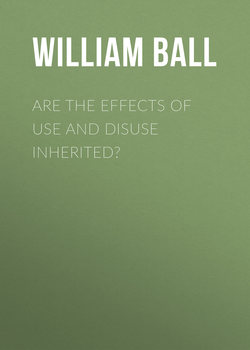Читать книгу Are the Effects of Use and Disuse Inherited? - Ball William Platt - Страница 5
SPENCER'S EXAMPLES AND ARGUMENTS
CROWDED TEETH
ОглавлениеThe too closely-packed teeth in the "decreasing" jaws of modern men (p. 13)5 are also suggestive of other causes than use and disuse. Why is there not simultaneous variation in teeth and jaws, if disuse is the governing factor? Are we to suppose that the size of the human teeth is maintained by use at the same time that the jaws are being diminished by disuse? Mr. Spencer acknowledges that the crowding of bull-dogs' and lap-dogs' teeth is caused by the artificial selection of shortened jaws. If a similar change is really occurring in man, could it not be similarly explained by some factor, such as sexual selection, which might affect the outward appearance at the cost of less obvious defects or inconveniences?
Mr. Spencer points to the decay of modern teeth as a sign or result of their being overcrowded through the diminution of the jaw by disuse.6 But the teeth which are the most frequently overcrowded are the lower incisors. The upper incisors are less overcrowded, being commonly pressed outwards by the lower arc of teeth fitting inside them in biting. The lower incisors are correspondingly pressed inwards and closer together. Yet the upper incisors decay – or at least are extracted – about twenty times as frequently as the closely packed lower incisors.7 Surely this must indicate that the cause of decay is not overcrowding.
The lateness and irregularity of the wisdom teeth are sometimes supposed to indicate their gradual disappearance through want of room in a diminishing jaw. But a note on Tasmanian skulls in the Catalogue of the College of Surgeons (p. 199) shows that this lateness and irregularity have been common among Tasmanians as well as among civilized races, so that the change can hardly be attributed to the effects of disuse under civilization.
5
References of course are to Factors of Organic Evolution.
6
P. 13; and Nineteenth Century, February, 1888, p. 211.
7
Tomes's Dental Surgery, pp. 273-275. Tomes observes that it is as yet uncertain in what way civilization predisposes to caries. But he shows that caries is caused by the lime salts in the teeth being attacked by acids from decomposing food in crevices, from artificial drink such as cyder, from sugar, from medicine, and from vitiated secretions of the mouth. It is evident that in civilized races natural selection cannot so rigorously insist on sound teeth, sound constitutions, and protective alkaline saliva. The reaction of the civilized mouth is often acid, especially when the system is disordered by dyspepsia or other diseases or forms of ill-health common under civilization. The main supply of saliva, which is poured from the cheeks opposite the upper molars, is often acid when in small quantities. But the submaxillary and sub-lingual saliva poured out at the foot of the lower incisors and held in the front part of the jaw as in a spoon, "differs from parotid saliva in being more alkaline" (Foster's Text Book of Physiology, p. 238; Tomes, pp. 284, 685). One observer says that the reaction near the lower incisors is "never acid." Hence (I conclude) the remarkable immunity of the lower incisors and canines from decay, an immunity which extends backwards in a lessening degree to the first and second bicuspids. The close packing of the lower incisors may assist by preventing the retention of decaying fragments of food. Sexual selection may promote caries by favouring white teeth, which are more prone to decay than yellow ones. Acid vitiation of the mucus might account both for caries and (possibly) for the strange infertility of some inferior races under civilization.
